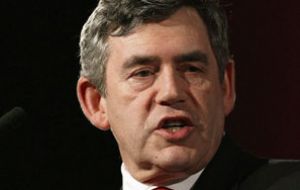MercoPress. South Atlantic News Agency
It’s official: UK economy crawling out of its deepest recession
 In spite of rebound PM Gordon Brown office anticipates “bumpy times potentially ahead”
In spite of rebound PM Gordon Brown office anticipates “bumpy times potentially ahead” The United Kingdom has officially emerged from its longest and deepest recession on record, with figures showing the economy grew by 0.1% in the last quarter of 2009. The result brings an end to six consecutive quarters of shrinking output for the British economy.
Despite the return to growth, the estimate from the Office for National Statistics came in below most analysts' forecasts for a 0.2% to 0.4% increase in gross domestic product. ONS also revealed that the UK economy shrank by 4.8% last year, the biggest annual decline since records began in 1949. Overall, the economy has contracted by 6% since the recession began in 2008.
The lower-than-expected growth will fuel concerns that recovery will be weak - and that Britain may succumb to a “double-dip” recession.
Speaking to Sky News, Business Secretary Lord Mandelson warned that businesses faced a lengthy struggle after taking drastic steps during the recession.
“They've had to cut costs, which might actually strengthen them in the long term, but in the meantime it is tough medicine for some people,” he said.“We're going to have to continue to be careful during the course of this year.”
A spokeswoman said Prime Minister Gordon Brown expected “bumpy times potentially ahead”.
“The Prime Minister's view echoes that of the Chancellor's that there is a cautious confidence around the growth figures and there are bumpy times potentially ahead, which is why we've got to lock in the recovery and maintain investment in the economy now to ensure that we don't risk that recovery,” she said.
Shadow chancellor Osborne told Sky News' Jeff Randall suggestions that Conservative plans for swift cuts in public spending would force unemployment up were wide of the mark, saying: “I don't accept the logic of that at all.”
“We want to see a net creation of jobs in this economy. In the short, medium and long run we want to see more jobs in this economy,” he said. “At the moment, the employment rate is falling and young people can't find work. That has got to be addressed.”
Mr Osborne insisted that public spending cuts under a Conservative government would not impact on troops on the front line in Afghanistan.
The fourth-quarter upturn was driven by the distribution, hotels and restaurants sectors, while manufacturing also rebounded, according to the ONS. <Government and other services also helped the expansion, although there was a small decrease in business services and finance in the quarter.
This initial estimate of GDP is based on just 40% of the relevant data, leaving the measure vulnerable to revisions in either direction when the ONS publishes its next set of figures in February.
The ONS figures came as separate data from the IMF predicted the UK recovery would outpace the Euro-zone over the next two years. The latest World Economic Outlook forecast 1.3% growth in UK output this year, rising to 2.7% in 2011.
That compared with estimates of 1% and 1.6% for the bloc of nations using the Euro. The US economy, meanwhile, was expected to grow at 2.7% this year, falling back to 2.4% in 2011.




Top Comments
Disclaimer & comment rulesCommenting for this story is now closed.
If you have a Facebook account, become a fan and comment on our Facebook Page!